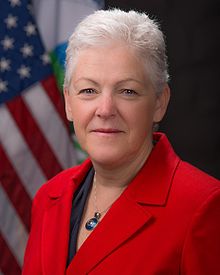 Recently, EPA Administrator Gina McCarthy made news (briefly) when she endorsed climate change education. The Irish Times, in an exclusive scoop asked, "Do you think that climate change should be part of the educational system?" Her answer:
Recently, EPA Administrator Gina McCarthy made news (briefly) when she endorsed climate change education. The Irish Times, in an exclusive scoop asked, "Do you think that climate change should be part of the educational system?" Her answer:
Very much so. I think part of the challenge of explaining climate change is that it requires a level of science and a level of forward thinking and you’ve got to teach that to kids. People didn’t have a sense of how dramatic climate change really is, and what it means for all of us. So that’s been a challenge. But what’s great about renewables is that when you put a solar panel on the roof of a school, you change the entire dynamic of education for the students. It’s hands-on.
That's true. And Administrator McCarthy's not alone in supporting climate and energy literacy and transforming schools. Former President of Ghana Agyekum Kufuor, one of the Ambassadors of Climate Change at the United Nations, has said much the same thing, calling on nations to scale up climate change education. “It does not really matter, whether developed, developing, or underdeveloped countries, all we need is to intensify education on this issue as our very survival depends on changes that we are experiencing on a daily basis.”
A number of organizations, too, such as the 62,000-member American Geophysical Union, have made strong statements in support of climate education, as detailed in our Voices for Climate Change Education.
Other leaders and groups have made occasional statements that support climate education, but often in a roundabout way. President Obama, for example, did not include education in his Climate Action Plan and only mentioned obliquely at the end of his 2013 Georgetown Climate Speech:
So I'm going to need all of you to educate your classmates, your colleagues, your parents, your friends. Tell them what’s at stake. Speak up at town halls, church groups, PTA meetings. Push back on misinformation. Speak up for the facts. Broaden the circle of those who are willing to stand up for our future.
But despite these calls to action, widespread support for climate change education is largely missing. Funding to develop curriculum and teacher professional development programs authorized by Congress in 2010 has all but dried up and no major philanthropic organizations have ponied up to support climate literacy efforts—not the Clinton Global Foundation, not the Bill and Melinda Gates Foundation, not Bloomberg, Rockefeller or any of the climate-specific foundations, such as the Energy or ClimateWorks Foundations. Nothing. Nada.
The reason for the lack of support for climate change education? In a word, denial.
Climate change denial is, as we've examined from a variety of angles previously, a complex topic and the primary focus of George Marshall's new book, Don't Even Think About It. Marshall’s book details the ways that we're wired to ignore and deny the scale, scope, and timeframe of human-caused climate disruption. But like most observers of the climate conundrum, Marshall ignores education as a contributing factor or possible response to overall climate confusion, focusing more on media, ideological, psychological, and social frames.
Like climate change denial in general, denial about the value or merit of climate education takes on a variety of guises. There's the "education doesn't really make any difference and may in fact be counter-productive" excuse. Or "it takes too long and kids don't vote" excuse. And even "it would be nice if people learned about climate in school but it won't ever happen." I've heard these rationales and variations thereof for years, sometimes from people I wouldn't expect to be climate deniers.
Researcher Jon Krosnick , for example, has conducted social science research about people's attitudes toward climate change for many years. At a recent TomKat symposium, he was totally dismissive of climate change education, suggesting we should just let experts handle the problem of climate change and not try to educate young people about it.
Other "experts" have made similarly flippant and uninformed comments that perpetuate the meme that "climate change education is ineffective/ too long-term/ a waste of time/ doesn't work/ never will work", making the already hugely challenging lives of those of us who live and breath climate and energy education all the more difficult. Such dismissal or downplaying of quality education as a means to counter and combat climate change, is false and counterproductive in the extreme.
The fact that many in the climate community disregard or downplay the value of climate education is cause for pause. As we've examined before, the evidence is clear: those who know more about climate change are more concerned and therefore more motivated to do something about it than those who are less well informed or outright dismissive.
If even a fraction—say 1%—of the billions of public and private funds spent each year on climate related technology and politics were allocated to climate literacy and transforming schools into inspiring, engaging living laboratories, the world would be a different and likely safer and saner place than it is now.
